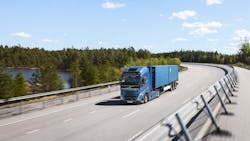Volvo Trucks tests hydrogen fuel cell electric trucks
Volvo Trucks is running tests of fuel cell electric trucks that only emit water vapor and have an operational range comparable to diesel trucks, up to 625 miles (1,000 km). A second pilot phase is to follow in a few years’ time and will see customer tests on public roads.
The testing of fuel cell electric trucks in commercial traffic will start in 2025 with selected customers in Northern Europe, followed by additional trucks in more countries over the coming years.
Hydrogen-powered fuel cell electric trucks will be especially suitable for long distance and heavy, energy-demanding assignments. They could also be an option in countries where battery charging possibilities are limited.
“I believe that the pilot tests will highlight the potential for fuel cell electric trucks,” said Jessica Sandström, SVP of global product management at Volvo Trucks. “The tests will run in a demanding, harsh climate and it also give us a great opportunity for driving with heavy loads up 65 tons.”
The goal of the pilot tests will be to look at all different aspects of the truck’s operation including working components, handling, and driver experience.
A fuel cell generates its own electricity from the hydrogen onboard instead of being charged from an external source. The only biproduct emitted is water vapor. Volvo’s electric trucks will use two fuel cells with a capacity to generate 300 kW of power and will have a refuel time of less than 15 minutes.
Fuel cell technology is still in an early phase of development and whilst there are many benefits there remains some challenges, not least the large-scale supply of green hydrogen* and need to develop fueling infrastructure. To overcome the lack of available hydrogen when running the pilots, the filling of green hydrogen from renewable sources will be done at the home-depot.
“We expect the supply of green hydrogen to increase significantly during the next couple of years, since many industries will depend on it to reduce CO2,” Sandström said. “The fuel cell trucks will be important for longer and heavier transportations in a few years from now.”
The fuel cells will be supplied by cellcentric—the joint venture between the Volvo Group and Daimler Truck AG. Cellcentric will build one of Europe’s largest series production facilities for fuel-cells, especially developed for heavy vehicles.
See also Fleet Maintenance’s coverage of cellcentric and other hydrogen fuel cell vehicles in its award-winning article The dawn of hydrogen trucks, winner of the 2022 Folio: Eddie for Technology in the B2B category.
